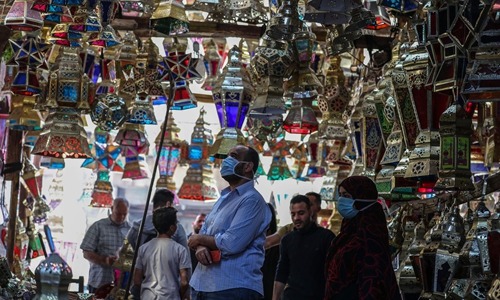Middle East braces for bleak Ramadan as virus threat lingers
Source:AFP Published: 2020/4/20 18:33:40

Egyptians look at traditional lanterns known in Arabic as "Fanous" sold during the Muslim holy month of Ramadan in Cairo's Sayeda Zainab neighborhood, Egypt on Sunday. Photo: AFP
From canceled iftar feasts to suspended mosque prayers, Muslims across the Middle East are bracing for a bleak month of Ramadan fasting as the threat of the COVID-19 pandemic lingers.
Ramadan is a period for both self-reflection and socializing. Believers fast from dawn to dusk and then gather around a family or community meal each evening of Islam's holiest month, which begins later this week and ends with Eid al-Fitr festivities.
However, this year, the fast-spreading novel coronavirus threatens to dampen Ramadan like never before, with millions locked down across the Middle East - from Saudi Arabia and Lebanon to the battle zones of Libya, Iraq and Yemen.
More dispiriting for many devout Muslims is that congregational worship - including taraweeh night prayers - is prohibited in mosques across the region, with many closed in a bid to slow the spread of the virus.
Several countries' religious authorities, including Saudi Arabia's Grand Mufti Abdulaziz al-Sheikh, have ruled that prayers during Ramadan and Eid be performed at home.
"Our hearts are crying," said Ali Mulla, the muezzin at the Grand Mosque in Mecca.
"We are used to seeing the holy mosque crowded with people during the day, night, all the time... I feel pain deep inside."
In recent weeks, a stunning emptiness has enveloped the sacred Kaaba - a large black cube structure draped in gold-embroidered cloth in the Grand Mosque towards which Muslims around the world pray.
The white-tiled area around the Kaaba is usually packed with tens of thousands of pilgrims.
Ramadan is considered an auspicious period to perform the year-round umrah pilgrimage, which Saudi authorities suspended in March.
It is likely that the larger hajj pilgrimage, set for the end of July, will also be canceled for the first time in modern history after Saudi Arabia urged Muslims to temporarily defer preparations.
The Grand Mufti of Jerusalem and the Palestinian Territories Muhammad Hussein has announced similar prayer restrictions during Ramadan, while also advising against the public sighting of the crescent moon, which is used to estimate the start of the holy month.
AFP
Posted in: MID-EAST